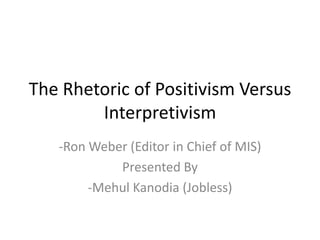
Rhetoric on Positivism and Interpretivism
- 1. The Rhetoric of Positivism Versus Interpretivism -Ron Weber (Editor in Chief of MIS) Presented By -Mehul Kanodia (Jobless)
- 2. LIFE OF PI POSITIVISTS INTERPRETIVISTS
- 3. POSITIVISM INTERPRETIVISM • August Comte- founded • Max Weber; William Dilthey Sociology; John Stuart Mill; • Associated with Symbolic Emile Durkheim interactionism, • Associated with Structural – constructionism, ethno functional, rational methodology, hermeneutics, choice, exchange-theory phenomenological, qualitative frameworks sociology • Related to ‘hermeneutics’- indepth inquiry into texts in which the parts are related to the whole for revealing deeper meanings
- 4. POSITIVISM • Maintains that reliable knowledge is based on direct, verifiable observation or manipulation of natural phenomena through empirical/ experimental means. • Aims to discover universal laws of behaviour- nomothetic orientation • Believes in existentialist orientation to reality- reality is for us to discover, it is patterned, stable, and additive • Believes in a mechanical model of human beings- rational, pleasure seeking • Seeks the facts or causes of social phenomena with little regard for the subjective states of individuals, opinions etc; • Objectivity and Replicability –important criteria • Maintains Social Science should be value free – ‘disinterested scientist’ • Discovers universal causal laws -nomothetic; Essentialist, Verification- oriented, Reductionist, Deterministic, Inferential and Hypothetico- deductive, predictive
- 5. INTERPRETIVISM • Maintains that the world is constructed, interpreted and experienced by people in their interactions within their environment- reality is socially constructed by people- constructionist view point; • Emphasizes voluntary, free choice of humans- voluntarism; human agency • Relies on subjective meanings/ perceptions of people, contexts, beliefs –idiographic i.e. limited abstraction and particularistic • Understanding human behaviour from the actor’s own frame of reference • SS needs to be relativistic regarding value positions (i.e. no single value position is better than others; all are equally valid) • Grounded, discovery-oriented, exploratory, expansionist, descriptive, and inductive; exploratory research
- 6. Sociological theory is a bit like political parties. There are a range of sociologists who have differing opinions about how the world operates. Examples of some of these groups are: Functionalists Marxists Interactionists Feminists Post-Modernists These groups then fall into one of two categories and will either be known as: Positivists Interpretivists
- 7. So, who controls who? Does Society control us? Do we control society? (Positivism) (Interpretivism)
- 8. Positivism vs Interpretivism Positivists believe we are influenced by Interpretivists believe in social social systems, that society controls who action, that we as individuals we are control society Positivists use large samples Interpretivists use small of people samples/individuals MACRO MICRO
- 9. Positivism vs Interpretivism • Also known as top-down/macro/social • Also known as bottom up/micro or social systems or structural theory action theory • Believe that it is important to look at • Believe that it is important to analyse society as a whole when studying it society by studying individuals • Believes sociologists should use more • Believes sociologists should use more in- scientific approaches to society depth approaches to society • Use methods such as Statistics and questionnaires • Use methods such as observations and in- depth interviews • Examples are Functionalists, Marxists and Feminists • Examples are Interactionists and Post- modernists
